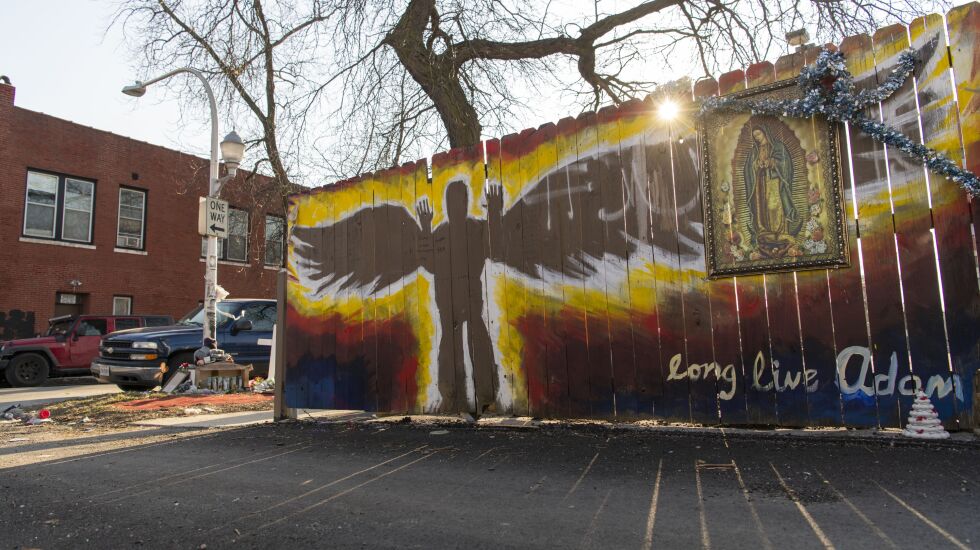
More than a year after the controversial fatal shootings of 13-year-old Adam Toledo and 21-year-old Anthony Alvarez during foot pursuits, the Chicago Police Department unveiled a policy Tuesday that places more limits and oversight on such chases.
The policy, which is expected to be implemented by the end of the summer, includes “clearer guidelines” and additional training for officers, as well as improved data collection to analyze pursuits, according to a department statement. It notably bars officers from chasing a person simply for fleeing, and advises them to reconsider pursuing someone who appears armed with a gun.
“The safety of our community members and our officers remain at the core of this new foot pursuit policy,” Supt. David Brown said in the statement. “We collaborated internally with our officers and externally with our residents to develop a policy we all have a stake in.”
The monitoring team tracking the department’s compliance with sweeping court-ordered reforms had recommended adopting a foot pursuit policy last March — weeks before Alvarez and Toledo were fatally shot by officers during chases. Toledo was shot in the chest after dropping a gun and raising his hands, and Alvarez was struck in the back while holding a firearm.
During a news conference Tuesday, Brown said police officials had been discussing a foot pursuit policy “for several years before those shootings happened.” In addition to “listening to the community” and negotiating with the monitoring team and other “stakeholders,” Brown said officers discussed their concerns about being “supported in doing their job.”
The CPD unveiled a temporary policy last May before releasing a draft of the final policy in February, soliciting the public’s input following criticism that the initial effort was vague and inadequate.
Under the final policy, cops are prohibited from engaging in chases unless “there is a valid need to detain the person” that “outweighs the threat to safety posed by pursuit.”
“The mere act of flight alone” doesn’t justify a foot pursuit, and an officer can’t initiate a chase “based solely on a person’s response to the presence of police,” such as running off or declining to talk.
Officers should also “consider alternatives” to chasing someone under various circumstances, including if the suspect “is visibly armed with a firearm” or an officer is acting alone.
Officers can only chase a suspect who has committed — or who is about to commit — a felony, a Class A misdemeanor, a traffic offense that “endangers the physical safety of others,” or an “arrestable offense” that “poses an obvious physical threat to any person.”
Officers are prohibited from pursuing people engaged in some misdemeanors, like parking and ordinance violations, and certain traffic offenses such as licensing and insurance violations.
In the end, Brown acknowledged, “the officer decides” whether to engage a suspect based on “reasonable suspicion.”
“It’s the standard for everything we do. ... It’s the legal standard. It’s the constitutional standard,” he said. “So that’s not a change that should alarm any officers or any critics of whether or not [the] foot pursuit allows you to do your job.”
But later Tuesday, the ACLU of Illinois continued to raise “profound concerns” about the policy, warning that key aspect effectively allows officers to chase someone based on a “lower standard” than the probable cause needed to make an arrest.
“If officers don’t have probable cause, they shouldn’t be chasing people,” said Alexandra Block, an attorney with the civil rights organization.
As part of a coalition involved in the CPD’s reform process, the ACLU of Illinois submitted various proposed changes to the foot chase policy. Block said most have fallen on deaf ears, including recommendations to make clear the inherent danger of foot pursuits and to narrow the list of crimes that warrant a chase.
“They should not be misdemeanors and minor offenses,” she said. “Foot pursuits are so dangerous that they should be limited to only the most serious suspected crimes.”
Robert Boik, the executive director of the department’s Office of Constitutional Policing and Reform, said the finalized policy includes two main changes: “enhanced supervision” that mandates two separate reviews of pursuits; and a form for officers to fill out after engaging in a chase to ensure the department is “collecting information that better informs policies, tactics [and] training.”
Boik noted the new policy “will not go into effect until every officer has been trained” on the changes.
“We do expect the policy to go live by the end of the summer,” he said.
The finalized policy can be read here.







